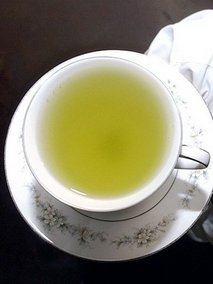 A chemical found in green tea helps inhibit sexual transmission of the virus which causes AIDS, said a study Tuesday that recommends using the compound in vaginal creams to supplement antiretrovirals.
A chemical found in green tea helps inhibit sexual transmission of the virus which causes AIDS, said a study Tuesday that recommends using the compound in vaginal creams to supplement antiretrovirals.
Medical experts at Germany's University of Heidelberg said the compound could be a low-cost arrow in the quiver of medical weapons to fight the spread of HIV in research-poor countries.
The researchers said they determined that the green tea polyphenol, or vegetable tannin, called epigallocatechin-3-gallate (EGCG) is capable of neutralizing a protein in sperm which serves as a vector for viral transmission during sex.
EGCG degrades what is known as a semen-derived enhancer of virus infection, or SEVI, described in the study as "an important infectivity factor of HIV."
Writing in the online edition of the Proceedings of the National Academy of Sciences, the researchers said they "recently identified a peptide fraction in human semen that consistently enhanced HIV-1 infection."
SEVIs capture viral elements and attach them to the surface of target cells, enhancing cell fusion and decreasing a cell's ability to repel viral threats.
EGCG "targets SEVI for degradation" and "abrogates semen-mediated enhancement of HIV-1 infection in the absence of cellular toxicity," said the researchers, some of whom work at the university's Heinrich-Pette-Institute for Experimental Virology and Immunology.
Because of its effects on semen-based HIV transmission threats, the study's authors said "EGCG appears to be a promising supplement to antiretroviral microbicides to reduce sexual transmission of HIV-1."
With the vast majority of the world's 33 million people with HIV infected through heterosexual sex, and as 96 percent of new infections occur in poor and developing nations, researchers said the use of green tea EGCG in topical creams would "provide a simple and affordable prevention method" to guard against HIV transmission.
Green tea, which originated in China and is widely consumed in Asia, the Middle East and growing numbers of western countries, is already popular for its antioxidant qualities.
(Agencies via China Daily May 25, 2009)